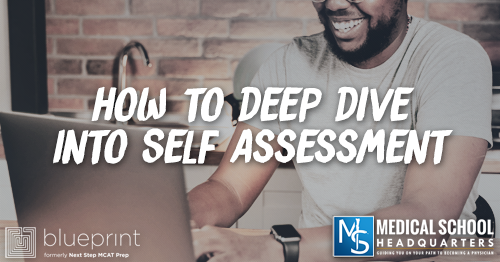Apple Podcasts | Google Podcasts
Session 300
We’re 300 episodes in! Let’s take the time to reflect as well as announce the 30 winners of 10 packs of Blueprint MCAT’s full-length exams, as well as a year of Mappd Pro for free.
We’re joined by Armin from Blueprint MCAT. If you would like to follow along on YouTube, go to premed.tv.
Listen to this podcast episode with the player above, or keep reading for the highlights and takeaway points.
[02:39] The Difference Between a 490 MCAT and a 529 MCAT Student
Your MCAT score defines you as someone who can score whatever it is that you scored on the MCAT. And that’s just it!
“There are a lot of students out there who conflate the MCAT with the ability to be a physician… and it is not that.”
Remember that there’s not really a difference between a 528 MCAT student and a 500 MCAT student. Those students get through medical school just fine. Maybe that 490 MCAT student is going to struggle. Maybe they don’t have the foundational knowledge to help them get a better score. Maybe they are lacking some critical thinking and analysis skills. Or maybe they just took the test without preparing at all.
“Higher MCAT scores don’t mean a better physician. Higher MCAT scores don’t mean better medical students.”
The only thing a higher MCAT score means is that you got a higher MCAT score. There are medical schools out there that don’t understand those differences because they are trying to one-up another school.
At the end of the day, the MCAT is just the MCAT. It’s just a test that is an unfortunate speed bump on the way to medical school.
[05:08] The MCAT is Just the MCAT
“The biggest benefit of the MCAT is really the effort that goes into taking the MCAT.”
The MCAT is just there as a potential test. Are you willing to put some time and effort into this thing and get a decent enough score? If you got 500 and above, you’re probably doing really well.
The MSAR says that the median score is 517 for the school that they want to go to. But it’s just a number. So just keep that in mind as you’re going through this process, that the MCAT is just the MCAT.
[07:13] The Correlation Between MCAT and Step 1
Plenty of data shows the MCAT is not great for non-native English speakers. Now, I had a student who is a non-native English speaker who scored the highest out of everyone in the country when taking USMLE Step 1.
Just because you struggle with the MCAT because it’s a unique test doesn’t mean you’re going to struggle with Step 1. Step one is a very different test. So don’t stress out too much about the MCAT.
[07:58] The Future of MCAT and The MCAT Podcast
Check out The Premed Years Podcast Episode 520 with Dr. Bryan Carmody, a pediatric nephrologist. We talked about US News and World Report and med schools pulling out of their participation in it.
One of the variables that go into that methodology is that the higher your average MCAT score for your cohort of students, the better you get ranked in US News and World Report. That’s a very bad reason to want higher MCAT scores when ultimately it’s not affecting education. It’s not affecting anything. It just means higher MCAT scores. But in terms of the future of the MCAT, it’s not going anywhere, at least anytime soon.
As for The MCAT Podcast, our goal here is to continue to provide you with the best free MCAT prep in podcast form. We also record videos. Check out premed.tv and see when we’re going over questions and passages and stuff. You can watch all of that right there.
[11:05] Resources to Help You on Your Journey
Check out Blueprint MCAT and their full-length exams as well as Mappd Pro where you can get access to chat advising. You can also start using our new myLORs, a third-party letter recommendation service. Start collecting your letters, ideally the year that you’re applying. But you can start collecting them in January instead of waiting until May when the applications open up.
Links:
SEARCH SITE
SEARCH SITE
LISTEN FOR FREE












